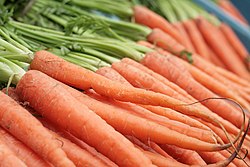burkāns
Appearance
See also: burkans
Latvian
[edit]
Etymology
[edit]The word is first mentioned in Latvian in 17th-century dictionaries. It is a heavily discussed word spread around the Baltic Sea, up to Russian бурка́н (burkán), борка́н (borkán) and Finnish porkkana, Estonian porgand, Livonian borkõn, borkõnz, borkkiņ, the immediate sources of which are unknown but are sought in any of the neighbouring Indo-European languages. Possible scenarios:
- It is a borrowing from Baltic German Burkane, from Middle Low German, itself
- from Old Frisian bure, burre (“conic root; top of a stake, pile (in the ground)”) + a diminutive suffix -ken, -kan (cf. the Old Frisian reduced form burke (“little root”)). But it is dubious that the diminutive suffix would get a long vowel and even become stressed. In turn it is tempting to assume in this constellation that the German is from Latvian. One needs to ask why this word has prominence only in the extreme fringes of the German and Russian language areas respectively.
- from Burgundian rule over the Netherlands, hence the word would just reflected the country name Burgundy. This is backed by the observation of the carrot plant’s spread in the Late Middle Ages from the Mediterranean over Middle Europe to Northeast Europe. But the transmitting forms of Low German and Dutch dialects are in question.
- It is from a Proto-Indo-European *br̥k, *mr̥k with reflexes in Lithuanian burkūnas, burkañtas, Ancient Greek βράκανα (brákana), Russian борка́н, бурка́н (borkán, burkán) on the one hand and Proto-Slavic *mъrky and Proto-Germanic *murhǭ on the other.
- It is from a non-Indo-European substrate language which had an alternation that explains the anlaut variation between the voiced bilabial plosive and the voiced bilabial nasal of the aforementioned words. Ancient Greek βράκανα (brákana, “wild vegetables”) is a random correspondence if not remotely related via the source language of this word.
- The Baltic words are possibly from a non-Indo-European substrate language and German and Russian derive from Latvian. Proto-Slavic *mъrky and Proto-Germanic *murhǭ are random correspondences, possibly from an unrelated substrate.
Pronunciation
[edit]Noun
[edit]burkāns m (1st declension)
- carrot (a plant with a large edible root, often orange in colour, esp. Daucus carota)
- galda burkāns ― common (lit. table) carrot
- lopbarības burkāns ― forrage carrot
- burkānu vaga ― carrot furrow
- burkānu lauks ― carrot field
- ravēt burkānus ― to weed carrots
- burkānu kaitēkļi ― carrot pests
- no savvaļas burkāna krustojot izaudzēts lauku burkāns ― by crossing wild carrots the field carrot was grown
- carrot (the edible root of that plant, often orange in colour and used as a vegetable)
- dzert burkānu sulu ― to drink carrot juice
- burkānu salāti ― carrot salad
- tīrīt burkānus ― to clean carrots
- pagrabos glabā kartupeļus, burkānus, bietes un citas saknes ― in the cellars one stores potatoes, carrots, beets and other roots
- Tenis atkal piesarka kā burkāns ― Tenis again blushed like a carrot
Declension
[edit]Declension of burkāns (1st declension)
| singular (vienskaitlis) | plural (daudzskaitlis) | |
|---|---|---|
| nominative (nominatīvs) | burkāns | burkāni |
| genitive (ģenitīvs) | burkāna | burkānu |
| dative (datīvs) | burkānam | burkāniem |
| accusative (akuzatīvs) | burkānu | burkānus |
| instrumental (instrumentālis) | burkānu | burkāniem |
| locative (lokatīvs) | burkānā | burkānos |
| vocative (vokatīvs) | burkān | burkāni |
References
[edit]- Junttilla, Santeri (2014) “Die alten baltischen Lehnwörter im neuen estnischen etymologischen Wörterbuch”, in Baltu Filoloģija[1], volume XXIII, number 2, page 131
- Karulis, Konstantīns (1992) “burkāns”, in Latviešu Etimoloģijas Vārdnīca[2] (in Latvian), Rīga: AVOTS, →ISBN
- “Möhre” in Digitales Wörterbuch der deutschen Sprache
Categories:
- Latvian terms with unknown etymologies
- Latvian terms borrowed from Baltic German
- Latvian terms derived from Baltic German
- Latvian terms derived from Middle Low German
- Latvian terms derived from Old Frisian
- Latvian terms derived from Proto-Indo-European
- Latvian terms derived from substrate languages
- Latvian terms with IPA pronunciation
- Latvian words with level intonation
- Latvian terms with audio pronunciation
- Latvian lemmas
- Latvian nouns
- Latvian masculine nouns
- Latvian terms with usage examples
- Latvian first declension nouns
- Latvian etymologies from LEV
- lv:Celery family plants
- lv:Vegetables
